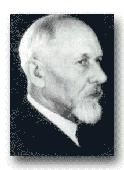Prominent Poles
Tomasz Arciszewski, politician, Prime Minister of Poland

Born: November 4, 1877, Sierzchów, Russian partition of Poland (presently Poland)
Died: November 11, 1955, London, England
Early days.His parents were Mikołaj Arciszewski, a veteran of the January Uprising and Helena née Młynarska. After graduating from trade schools in Lubań and Radom, Tomasz Arciszewski moved to Sosnowiec, an ever-growing centre of heavy industry of the region of Zagłębie. There in 1894 he started working as a factory worker in a steel foundry.
Joining PPS. In 1896, Arciszewski joined PPS (Polska Partia Socjalistyczna = Polish Socialist Party). He
participated in the 1906 attempt on the life of Russian chief of police in the Krolestwo Polskie (Polish Kingdom was the
name of the part of Poland occupied by Russia). In 1918, PPS and its close ally, PPSD, called for strikes and
demonstrations against the attempts to incorporate the Chelm region into Ukraine. Pogotowie Bojowe (Fighting
Emergency) was created with Arciszewski as its leader. On October 1, 1918, Emergency killed the chief of the German
police in Warsaw, Erich von Schultze. On November 2, 1918, a group of representatives from the Polish political parties -
PPS, PPSD, PSL-Wyzwolenie (a peasant party), SNZ and POW - decided to form a government which was officially
announced on November 7, 1918 in Lublin. Its Prime Minister became Ignacy Daszynski, a member of PPSD (an equivalent
of PPS in the Austrian-occupied part of Poland).
Minister in the Polish government. Arciszewski served there
as the Minister of Post. The program of this leftist government included: independence of all Polish lands, equal political
rights for all citizens of Poland, eight hours work days, safety inspectors, mandatory insurance against accidents and for
retirement, paid vacations, protection of tenants and rights for association.
Representative to the
parliament. In the leadership of PPS. In independent Poland, Arciszewski was a representative to the Polish
parliament (Sejm) during the years 1919-1935. He was also a member of the leadership of PPS, and from 1931 to 1935,
the chairman of the Centralny Komitet Wykonawczy PPS (Central Executive Committee of the PPS).
Wartime
activities. During the war and the German occupation, Arciszewski became the representative of PPS-WRN (WRN
stands for “Wolnosc-Rownosc-Niepodleglosc” = “Liberty-Equality-Independence” the wartime name of PPS). In July 1944,
he was clandestinely transported by airplane to London.
Prime Minister in Exile.
On November 29, 1944, Arciszewski became the Prime Minister of the Polish Government in Exile after the dismissal of
Stanislaw Mikolajczyk. In this position he was adamantly opposed to having new boundaries and a new communist
government imposed on Poland. He expressed those opinions in a dramatic protest against the Yalta conference
decisions. During his tenure, on July 5, 1945, the USA and Great Britain withdrew their recognition of the Polish
Government in Exile. In 1947, Arciszewski resigned. In 1954, he was elected to the Rada Trzech (Council of Three), which
was the organ of the executive authority of the Polish emigrants. The two other members of the Council of Three at that
time were W. Anders and E. Raczynski. Arciszewski was also the Chairman of the Central Foreign Committee of the PPS.
He died in London in 1955.
Translated from Polish and compiled from the following sources:
Kancelaria Prezesa Rady
Ministrow
Biografia
Socjalizm
Wprost
Return to home page:
Prominent Poles
